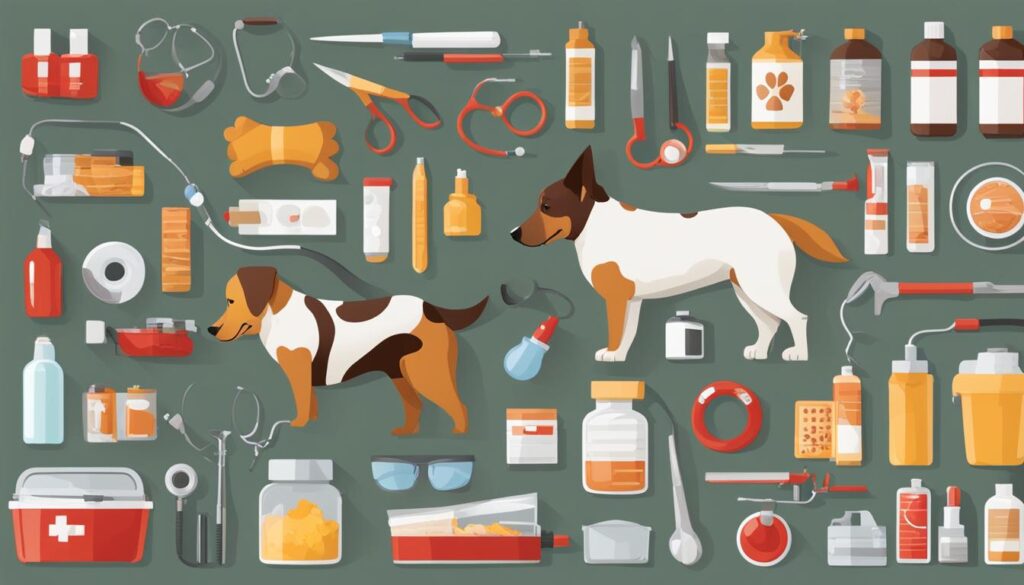As a dog owner, you want your furry friend to live a happy and healthy life. However, just like humans, dogs can experience health issues that can affect their well-being. Understanding common dog health problems and how to prevent them is crucial for pet owners. In this comprehensive guide, we will explore the most common dog health issues and provide tips for maintaining your dog’s health.
Key Takeaways:
- Being aware of common dog health problems is essential for pet owners
- Prevention is key to maintaining your dog’s health
- Proper nutrition, exercise, and regular check-ups are crucial for your dog’s well-being
- Dogs can experience mental health issues that can affect their overall health
- Understanding the potential risks in your dog’s environment can help you create a safe living space
Understanding the Common Illnesses in Dogs
As a pet owner, it’s important to be aware of the most common illnesses that can affect dogs. Early detection and prompt veterinary care can make all the difference in ensuring your furry friend’s well-being. This section provides an overview of some of the most prevalent illnesses in dogs, their symptoms, causes, and treatments.
Common Illnesses in Dogs
| Illness | Symptoms | Causes | Treatments |
|---|---|---|---|
| Ear infection | Ear discharge, scratching at ears, redness/swelling in ears | Bacteria, yeast, ear mites, allergies | Cleaning, medication, addressing underlying cause |
| Urinary tract infection | Frequent urination, straining to urinate, blood in urine | Bacteria, bladder stones, weakened immune system | Antibiotics, dietary changes, surgery if necessary |
| Dental disease | Bad breath, yellow/brown teeth, swollen gums, difficulty eating | Plaque buildup, bacteria, poor dental hygiene | Professional cleaning, home dental care, dietary changes |
| Obesity | Excess body weight, difficulty moving, lethargy | Overfeeding, lack of exercise, genetic predisposition | Dietary changes, exercise plan, weight management program |
Other common illnesses in dogs include allergies, arthritis, cancer, diabetes, and heart disease. While these conditions can be serious, early detection and proper treatment can significantly improve your dog’s quality of life.
Preventing Illnesses in Dogs
Prevention is always better than cure, and there are several steps you can take to minimize the risk of your dog getting sick. This includes:
- Regular check-ups with your veterinarian
- A healthy and balanced diet
- Regular exercise and mental stimulation
- Maintaining good hygiene and grooming practices
- Keeping up to date with vaccinations and preventative medications
By following these preventative measures, you can help keep your dog healthy and happy for years to come.


Recognizing and Managing Dog Diseases
Dogs are susceptible to several common health conditions that can impact their overall wellness. It’s crucial to recognize the signs early on and take the necessary steps to diagnose and manage these ailments effectively. Common health conditions in dogs include:
Parasites
Dogs can be affected by various parasites, including fleas, ticks, and heartworms. These parasites can cause severe health problems if left untreated. Symptoms of parasite infestation can include scratching, restlessness, and loss of appetite. Regular grooming and preventive treatment can help keep your dog healthy.
Canine Distemper
Canine distemper is a viral disease that can affect dogs of all ages. The symptoms of distemper can vary, but they may include fever, coughing, and nasal discharge. In severe cases, distemper can lead to neurological problems or even death. Vaccination is the best way to prevent this disease.
Ear Infections
Ear infections are a common health problem in dogs, particularly those with floppy ears. Symptoms can include scratching, shaking the head, and discharge from the ear. Regular cleaning and preventive treatment can help prevent ear infections from occurring.
Cancer
Cancer is a prevalent disease in dogs, and it can affect any part of the body. Symptoms can vary depending on the type and location of the cancer. Treatment options can include surgery, chemotherapy, and radiation therapy. Early detection is crucial for successful treatment.
Arthritis
Arthritis is a common health condition in older dogs, but it can affect dogs of any age. Symptoms of arthritis can include limping, stiffness, and difficulty moving. Treatment options can include medication, physical therapy, and weight management. Regular exercise can also help prevent or manage arthritis.
If you suspect that your dog is suffering from a health condition, it’s essential to seek veterinary care promptly. Your vet can recommend the appropriate diagnostic tests and treatment options to help your dog recover quickly. By being attentive to your dog’s health, you can help them live a long and healthy life.


Dealing with Common Dog Health Conditions
Dogs, like humans, can suffer from a range of health conditions that can affect their quality of life. As a responsible pet owner, it’s important to understand the signs and symptoms of these ailments to seek appropriate veterinary care. Here are some of the most common dog health disorders:
| Condition | Symptoms | Treatment |
|---|---|---|
| Allergies | Itching, sneezing, skin rash | Antihistamines, allergy shots, dietary changes |
| Arthritis | Joint stiffness, limping, reluctance to move | Pain relief medication, joint supplements, physical therapy |
| Dental Disease | Bad breath, swollen gums, tooth loss | Regular teeth cleaning, dental treats, chew toys |
| Obesity | Excessive weight gain, lethargy, difficulty breathing | Diet management, exercise, weight-loss medication |
These common health conditions in dogs can have a significant impact on their well-being, and it’s essential to take the appropriate steps to manage them. In addition to seeking veterinary care, there are also practical measures you can take as a pet owner to help alleviate your dog’s symptoms. For example, providing joint supplements and using ramps to help a dog with arthritis can ease their pain and discomfort.
Remember that prevention is key when it comes to managing dog health problems. Regular exercise, a balanced diet, and routine check-ups with a veterinarian can help prevent the onset of many of these issues.


By staying informed about common health conditions in dogs and taking proactive steps to manage them, you can help ensure that your furry companion lives a happy, healthy life.
Preventive Measures for Dog Health Problems
As a responsible pet owner, you want to ensure your furry friend stays healthy and happy. Taking proactive steps to prevent common dog health problems is essential to achieving this goal. Here are some preventive measures you can take to keep your dog healthy:
- Vaccinations: Getting your dog vaccinated is crucial to prevent infectious diseases. Speak to your veterinarian about the recommended vaccination schedule for your dog.
- Nutrition: Providing your dog with a balanced and nutritious diet can prevent various health issues, such as obesity, diabetes, and heart disease. Consult your veterinarian for advice on the best diet for your dog.
- Oral hygiene: Maintaining good oral hygiene can prevent dental problems, such as gum disease and tooth decay. Brush your dog’s teeth regularly and provide dental chews or toys to support their oral health.
- Regular exercise: Exercise is essential for your dog’s physical and mental well-being. Regular walks, playtime, and activities can prevent obesity, joint problems, and behavioral issues.
- Grooming: Keeping your dog clean and well-groomed can prevent skin infections and other health issues. Brush their coat regularly, trim their nails, and clean their ears and eyes as needed.
By following these preventive measures, you can significantly reduce the risk of common dog health problems. However, it’s important to note that even with preventive measures in place, your dog may still develop health issues. Regular check-ups with your veterinarian can help detect and address any health concerns before they become more serious.


Consult Your Veterinarian
Your veterinarian is your best source of information when it comes to maintaining your dog’s health. They can provide guidance on preventive measures, recommend suitable diets and exercise routines, and detect any health concerns early on. Don’t hesitate to consult your veterinarian if you notice any changes in your dog’s behavior or health.
Promoting a Healthy Lifestyle for Your Dog
To ensure your dog’s overall health, promoting a healthy lifestyle is crucial. From exercise to grooming, there are several simple steps you can take to maintain your dog’s well-being.
Regular Exercise
Regular exercise is an essential aspect of promoting your dog’s health. It not only helps to maintain their physical health but also promotes their mental well-being. Dogs require daily exercise to burn off excess energy, maintain a healthy weight, and prevent health issues related to inactivity.
It is important to tailor their exercise routine based on their breed, age, and health status. For instance, a young and active breed like a Labrador Retriever may require more exercise than an older and less active breed like a Bulldog. Consult your veterinarian to determine the appropriate exercise routine for your furry friend.
Healthy Diet
Nutrition is a key factor in promoting your dog’s health. Feeding your dog a healthy and balanced diet is essential for their overall well-being. The diet should contain adequate amounts of protein, carbohydrates, fats, vitamins, and minerals.
Avoid feeding your dog excessive amounts of treats or human food, which can lead to obesity and other health problems. Consult your veterinarian to determine the appropriate diet for your dog based on their breed, age, and health status.
Grooming
Grooming is another essential aspect of maintaining your dog’s health. Regular grooming can help to prevent skin infections, hair matting, and other issues related to poor hygiene. It also helps to promote healthy skin and a shiny coat.
Grooming tasks include brushing their coat, cleaning their ears, trimming their nails, and brushing their teeth. It is important to do these tasks regularly to prevent any issues from developing.
Regular Check-ups
Regular check-ups with your veterinarian are crucial to maintaining your dog’s health. Even if your dog appears healthy, regular check-ups can help to detect any underlying health issues and prevent them from developing into more serious conditions.
During the check-up, your veterinarian will conduct a physical examination, take blood and urine samples, and provide any necessary vaccinations or treatments. Consult your veterinarian to determine the appropriate check-up schedule based on your dog’s age and health status.


Tip: Maintaining a healthy lifestyle for your dog not only promotes their physical health but also their mental well-being. Regular exercise, a healthy diet, proper grooming, and regular check-ups are all essential aspects of a healthy lifestyle for your furry friend.
Environmental Factors and Dog Health
As a dog owner, you want to provide a safe and healthy environment for your furry companion. However, there are several environmental factors that can affect your dog’s health, and it is essential to be aware of them. In this section, we will discuss some common hazards that dogs may face, as well as how to prevent and manage them.
Toxins
Dogs may come into contact with various toxic substances in their environment, such as household cleaners, pesticides, and certain plants. These can cause a range of symptoms, including vomiting, diarrhea, and even seizures. To prevent your dog from being exposed to toxins, keep harmful products out of reach and avoid using pesticides in areas where your dog spends time. If you suspect your dog has ingested a toxic substance, contact your veterinarian immediately.
Parasites
Parasites, such as fleas, ticks, and heartworms, are common in dogs and can cause a variety of health problems. These include skin irritation, anemia, and heart disease. To prevent parasite infestations, use a monthly flea and tick preventative medication and have your dog tested for heartworm disease annually. Additionally, keep your dog’s living area clean and free of debris, as parasites thrive in warm, humid environments.
Extreme Weather Conditions
Dogs can be sensitive to extreme weather conditions, such as heatwaves and cold snaps. In hot weather, dogs are at risk of dehydration, heatstroke, and paw pad burns. To prevent these problems, ensure that your dog has access to plenty of fresh water and a shaded area to rest. In cold weather, dogs can suffer from frostbite and hypothermia. To keep your dog warm, provide a cozy shelter and consider using a dog sweater or coat.
Mental Health and Emotional Well-being in Dogs
Dogs are known for their loyalty and affection towards their owners. However, like humans, they can experience mental health issues that can affect their overall well-being. As a pet owner, it is essential to understand the common mental health problems in dogs and take measures to prevent or manage them.
Some common behavioral problems that dogs may exhibit include aggression, excessive barking, destructive behavior, and fearfulness. These problems can be caused by various factors, such as genetics, lack of socialization, or past trauma.
Separation anxiety is another common mental health issue that dogs may face. This condition occurs when dogs become excessively anxious or distressed when separated from their owners.
To promote your dog’s mental health, it is crucial to provide them with proper mental stimulation and training. Engage your dog in activities such as playing with toys, obedience training, and interactive games.
Benefits of Mental Stimulation
| Benefits of Mental Stimulation | Activities to Promote Mental Stimulation |
|---|---|
| Reduces boredom and anxiety | Playing with toys |
| Improves cognitive function | Training and obedience exercises |
| Strengthens the bond between you and your dog | Interactive games |
Regular grooming and exercise are also crucial components of promoting your dog’s overall well-being. Take your dog on daily walks, provide them with plenty of opportunities to play and engage in physical activity.
In summary, mental health and emotional well-being are essential for your dog’s overall health. By understanding the common behavioral problems dogs may exhibit, providing them with proper mental stimulation, and taking proactive steps to promote their well-being, you can help your furry friend live a happy and healthy life.


Conclusion
As a responsible pet owner, you play a crucial role in maintaining your dog’s health and well-being. By being aware of common dog health problems, you can take preventive measures and seek appropriate veterinary care when necessary.
Remember to keep an eye out for any unusual symptoms or behavioral changes in your furry friend and to stay informed about potential health hazards that may affect them.
Maintaining a Healthy Lifestyle for Your Dog
Regular exercise, proper grooming, and a balanced diet are all essential components of a healthy lifestyle for your dog. By providing them with adequate care, you can ensure they are happy and healthy for years to come.
Creating a Safe Environment for Your Dog
Be mindful of potential hazards in your dog’s environment, such as toxic substances or extreme weather conditions. By taking appropriate precautions, you can create a safe and healthy living space for your furry companion.
Addressing Your Dog’s Emotional Needs
Just like humans, dogs can experience mental health issues that can affect their overall well-being. Providing them with proper mental stimulation, attention, and affection can help promote their emotional health and happiness.
By incorporating these practices into your routine, you can ensure your dog’s holistic health and create a strong bond with your furry companion.
FAQ
What are some common dog health problems?
Common dog health problems include allergies, dental issues, obesity, ear infections, and arthritis.
How can I recognize if my dog is sick?
Signs that your dog may be sick include changes in appetite, lethargy, vomiting, diarrhea, coughing, sneezing, and abnormal behavior.
What should I do if I suspect my dog is ill?
If you suspect your dog is ill, it is best to consult with your veterinarian for a proper diagnosis and treatment plan.
How can I prevent common dog health problems?
Preventive measures for common dog health problems include regular veterinary check-ups, vaccinations, proper nutrition, regular exercise, and maintaining good hygiene.
Can I treat my dog’s health issues at home?
While minor issues like minor cuts or scrapes can be treated at home, it is always recommended to seek professional veterinary care for any significant health concerns.
What can I do to promote my dog’s emotional well-being?
Promoting your dog’s emotional well-being can be done by providing mental stimulation, socialization, regular exercise, and creating a safe and comfortable environment.
Are there any environmental factors that can affect my dog’s health?
Yes, environmental factors such as toxins, parasites, extreme weather conditions, and unsafe surroundings can impact your dog’s health. Taking necessary precautions can help prevent potential issues.
How can I manage common dog diseases?
Managing common dog diseases involves proper veterinary care, following recommended treatment plans, providing a balanced diet, and ensuring a clean and stress-free environment for your dog.
What should I do if my dog has a health condition?
If your dog has a health condition, consult with your veterinarian for a proper diagnosis and treatment recommendations. They can provide you with the best course of action to manage your dog’s specific condition.

